人教高中英语高一英语必修三Unit 2 Healthy eating Grammar and Usage.课件(22张ppt)
文档属性
| 名称 | 人教高中英语高一英语必修三Unit 2 Healthy eating Grammar and Usage.课件(22张ppt) |

|
|
| 格式 | zip | ||
| 文件大小 | 2.0MB | ||
| 资源类型 | 教案 | ||
| 版本资源 | 人教版(新课程标准) | ||
| 科目 | 英语 | ||
| 更新时间 | 2020-09-02 00:00:00 | ||
图片预览

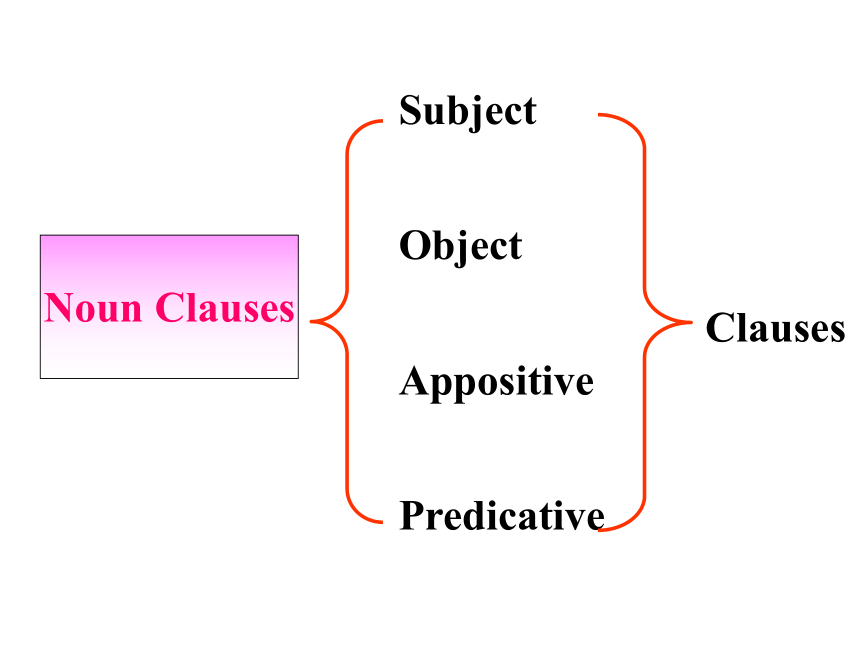
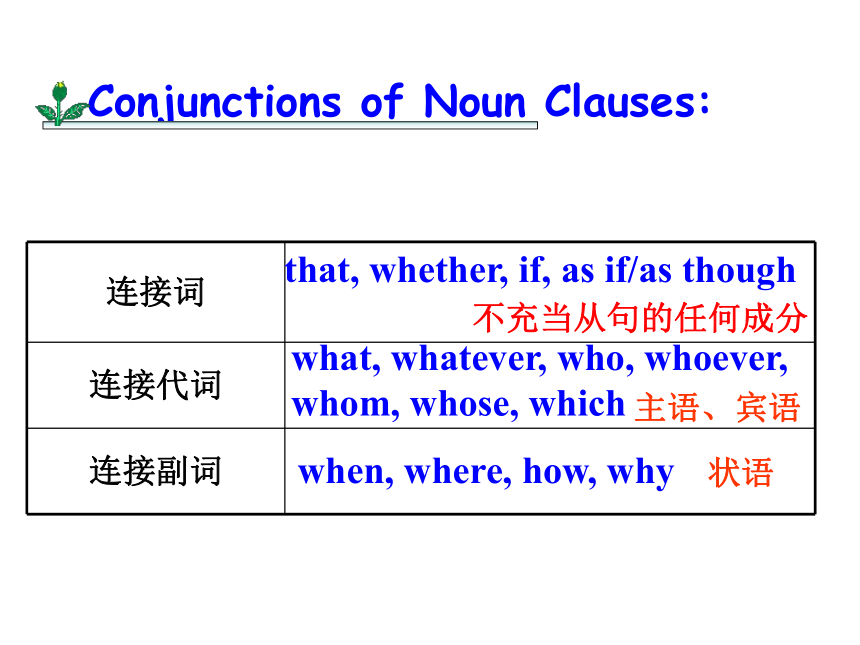
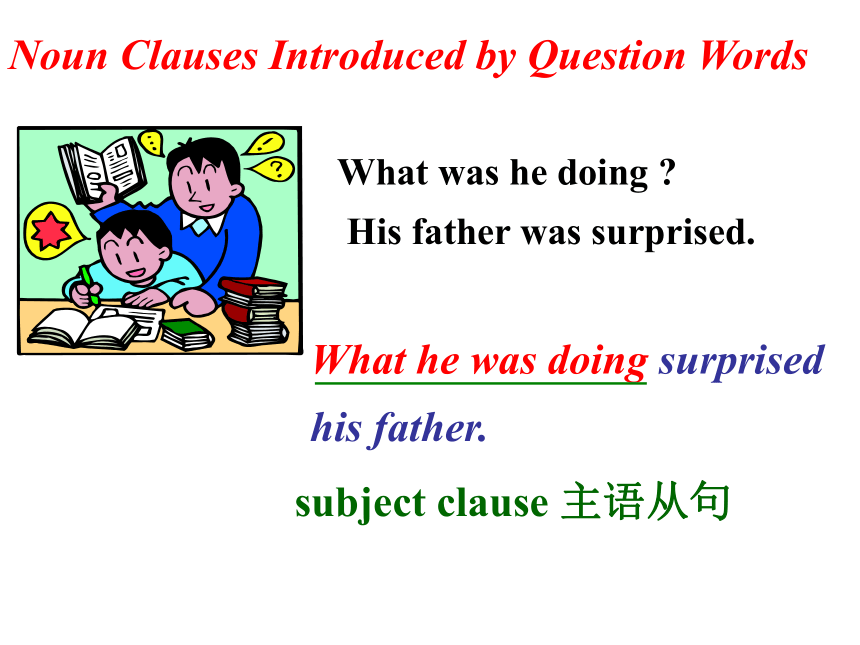
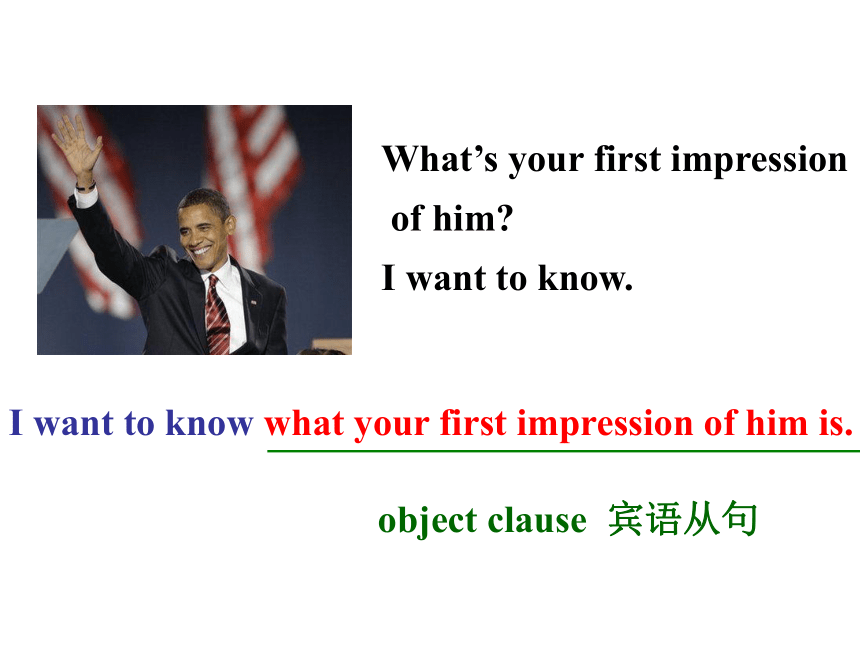
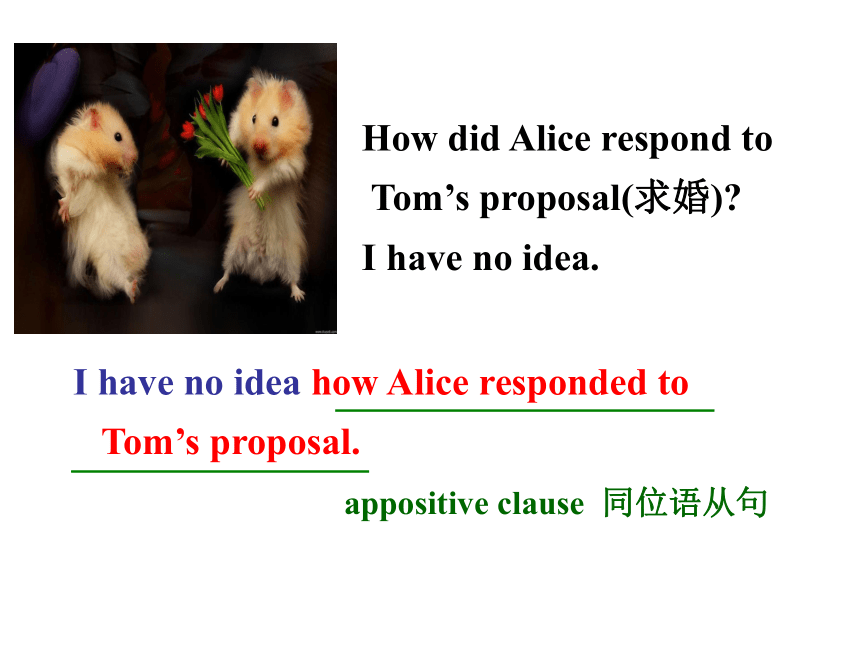
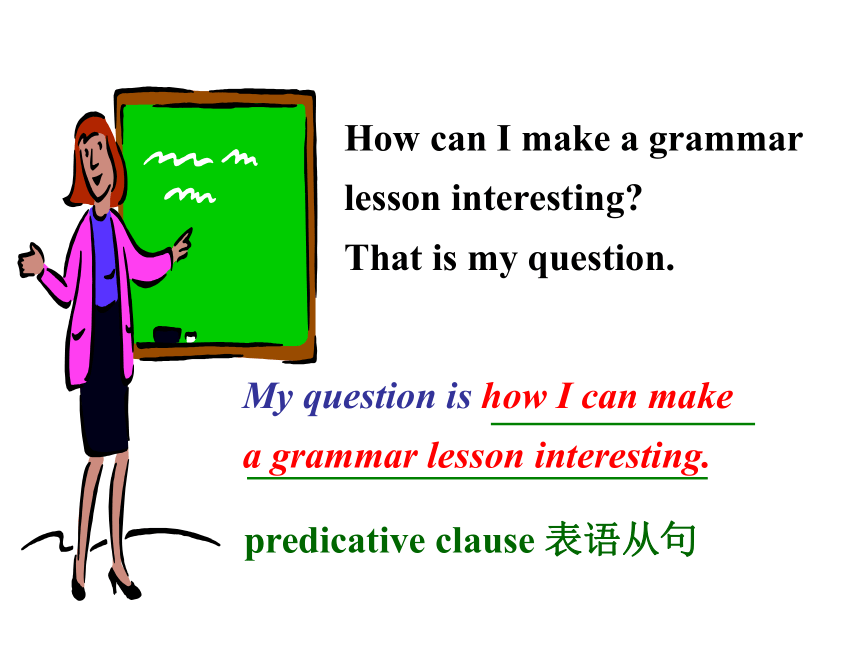
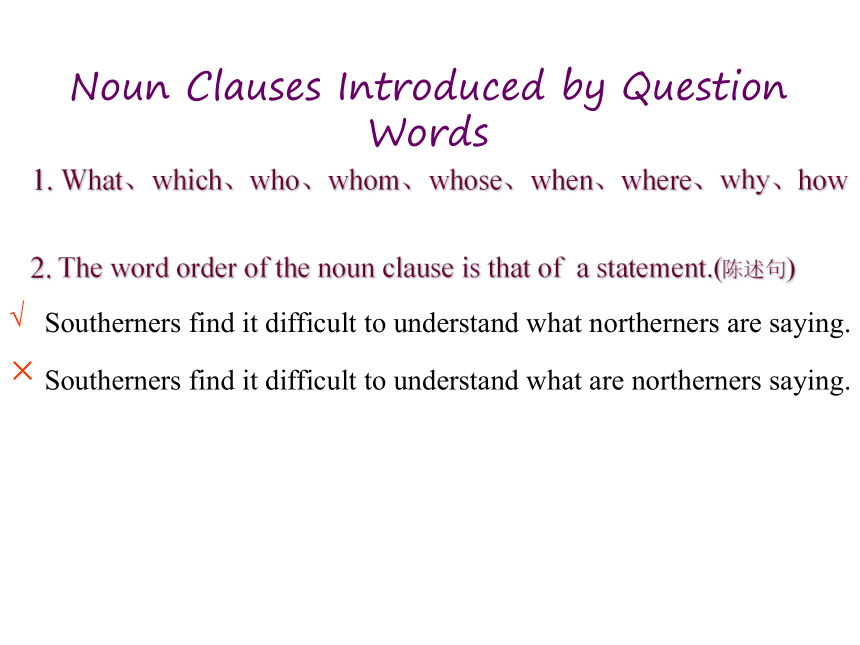
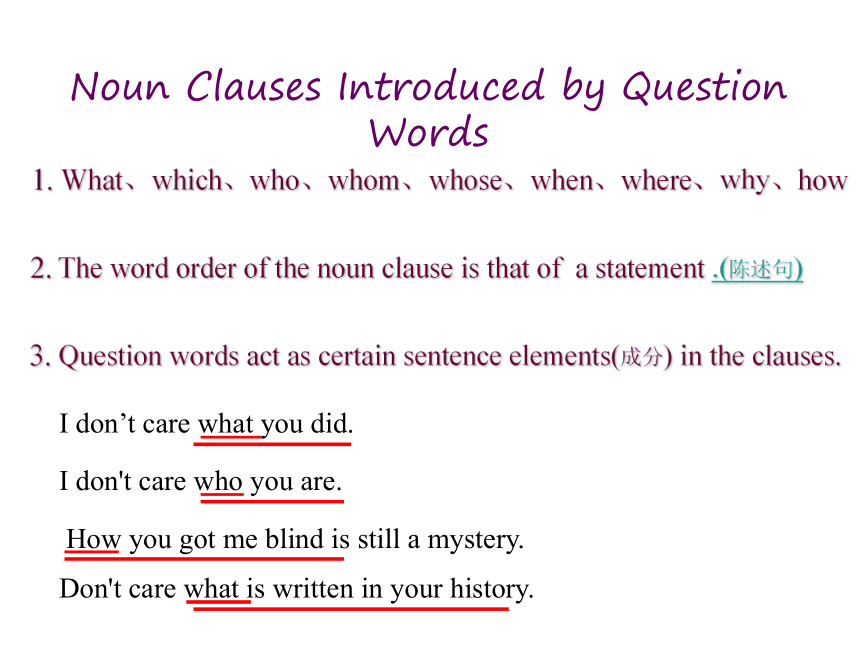
文档简介
(共44张PPT)
Noun
Clauses
Subject
Object
Appositive
Predicative
Clauses
Conjunctions
of
Noun
Clauses:
连接词
连接代词
连接副词
what,
whatever,
who,
whoever,
whom,
whose,
which
that,
whether,
if,
as
if/as
though
when,
where,
how,
why
状语
主语、宾语
不充当从句的任何成分
Noun
Clauses
Introduced
by
Question
Words
What
was
he
doing
?
His
father
was
surprised.
subject
clause
主语从句
What
he
was
doing
surprised
his
father.
What’s
your
first
impression
of
him?
I
want
to
know.
object
clause
宾语从句
I
want
to
know
what
your
first
impression
of
him
is.
How
did
Alice
respond
to
Tom’s
proposal(求婚)?
I
have
no
idea.
appositive
clause
同位语从句
I
have
no
idea
how
Alice
responded
to
Tom’s
proposal.
How
can
I
make
a
grammar
lesson
interesting?
That
is
my
question.
predicative
clause
表语从句
My
question
is
how
I
can
make
a
grammar
lesson
interesting.
Noun
Clauses
Introduced
by
Question
Words
Southerners
find
it
difficult
to
understand
what
northerners
are
saying.
Southerners
find
it
difficult
to
understand
what
are
northerners
saying.
√
×
2.
The
word
order
of
the
noun
clause
is
that
of
a
statement.(陈述句)
1.
What、which、who、whom、whose、when、where、why、how
I
don't
care
who
you
are.
I
don’t
care
what
you
did.
How
you
got
me
blind
is
still
a
mystery.
Noun
Clauses
Introduced
by
Question
Words
2.
The
word
order
of
the
noun
clause
is
that
of
a
statement
.(陈述句)
3.
Question
words
act
as
certain
sentence
elements(成分)
in
the
clauses.
1.
What、which、who、whom、whose、when、where、why、how
Don't
care
what
is
written
in
your
history.
2.
The
word
order
of
the
noun
clause
is
that
of
a
statement
.(陈述句)
3.
Question
words
act
as
certain
sentence
elements
(成分)
in
the
clauses.
4.
Question
words
can’t
be
left
out
in
noun
clauses
in
any
cases.
1.
What、which、who、whom、whose、when、where、why、how
Noun
Clauses
Introduced
by
Question
Words
‘Borrowed
Words’-----good
or
bad?
Languages
keep
borrowing
words
from
other
languages.
This
is
one
of
the
reasons
1_____languages
keep
changing
every
day.
2_____
we
should
do
about
the
increasing
number
of
‘borrowed
words’
in
our
vocabulary
is
something
that
deserves
careful
thought.
In
England
today,
there
is
no
one
to
decide
3______new
words
should
be
accepted
into
the
language.
A
standard
was
first
set
for
the
English
language
when
Henry
Ⅶ
was
the
King.
That
is4
_____we
have
the
phrase
‘the
king’s
English’.
He
set
a
standard
for
5______
people
should
speak
English,
but
today
6_____can
make
a
decision
like
that
is
anyone’s
guess.
However,
there
is
an
organization
to
make
decisions
like
this
in
France.
7_________French
will
be
used
is
decided
by
a
government
department….
Today,
the
spread
of
‘borrowed
words’
is
mostly
due
to
the
easily
accessed
Internet
and
television
programmes
from
across
the
world.
Some
people
are
optimistic
and
believe
that
this
process
is
good,
while
others
worry
that
it
may
result
in
language
pollution.
8_______opinion
you
agree
with
is
for
you
to
decide.
why
What
which
how
who
How
Which
how
2.
Whether
are
“borrowed
words”
good
or
bad?
This
remains
a
question.
Whether
“borrowed
words”
are
good
or
bad
remains
a
question.
That
languages
borrow
words
as
they
are
developing
is
inevitable.
1.
Languages
keep
borrowing
words
as
they
are
developing.
This
is
inevitable(必然的,不可避免的).
1.
We
can
use
it
as
an
preparatory
subject.
when
we
use
a
noun
clause
as
the
subject
of
a
sentence.
a.
(correct)
That
languages
borrow
words
as
they
are
developing
is
inevitable.=
(preferable)
It
is
inevitable
that
languages
borrow
words
as
they
are
developing.
b.
(correct)
Whether
“borrowed
words”
are
good
or
bad
remains
a
question.=
(preferable)
It
remains
a
question
whether
“borrowed
words”
are
good
or
bad.
Preparatory
subject
“it”:
Preparatory
subject
“it”:
1.That
we
would
be
not
able
to
understand
Old
English
today
is
certain.
=
It
is
certain
that
we
would
not
be
able
to
understand
Old
English
today.
2.Whether
English
will
continue
changing
in
the
future
is
easy
to
answer.
=
It
is
easy
to
answer
whether
English
will
continue
changing
in
the
future.
3.When
we
can
set
off
depends
on
the
weather.=
It
depends
on
the
weather
when
can
we
set
off.
(correct)
To
master
a
foreign
language
is
hard.
=
(preferable)
It
is
hard
to
master
a
foreign
language.
b.
(correct)
To
gain
access
to
the
Internet
is
important
for
us.
(preferable)
It
is
important
for
us
to
gain
access
to
the
Internet.
B.
when
the
subject
is
a
to-infinitive.
C.
when
the
subject
is
a
v-ing
form.
a.
(correct)
It
is
difficult
to
stop
smoking.
=
(
preferable)
Smoking
is
difficult
to
stop.
b.
(correct)
It
takes
a
lot
of
my
time
travelling
to
Beijing.
=
(preferable)
Travelling
to
Beijing
takes
up
a
lot
of
my
time.
We
usually
use
the
preparatory
subject
it
with
a
clause
or
to-infinitive
(preferable),
but
with
the
v-ing
form
we
prefer
the
real
subject
at
the
beginning.
Tip
2.
It
can
also
be
used
before
seem,
appear,
happen,
chance,
turn
out
and
prove
as
the
preparatory
subject
of
a
sentence.
It
seems
that
he
speaks
two
languages.
=
He
seems
to
speak
two
languages.
b.
My
new
neighbor
happens
to
come
from
my
home
town.
=
It
happens
that
my
new
neighbor
comes
from
my
home
town.
Preparatory
subject
“it”:
Assessment
:
1.
What
do
you
think
of
today’s
English
lesson?
2.
What
have
you
learnt
today?
3.
What
are
you
still
uncertain
about?
4.
How
do
you
like
your
performance
today?
It’s
clear
that…
We
feel
it’s
interesting
or
surprising
or
disappointing
that…
What
we
feel
uncertain
about
is
…
We
have
found
the
fact
that
…
We
think
today
our
performance
is
…
It
seems/proves
that…
1.
Someone
is
ringing
the
doorbell.
Go
and
see
____.
A.
who
is
he
B.
who
he
is
C.
who
is
it
D.
who
it
is
2.
_____
caused
the
accident
is
still
a
complete
mystery.
A.
What
B.
That
C.
How
D.
Where
3.
Go
and
get
your
coat.It's
____
you
left
it.
A.
where
B.
there
C.
here
where
D.
where
there
4.
What
the
doctors
really
doubt
is
_____my
mother
will
recover
from
the
serious
disease
soon.
A.
when
B.
if
C.
whether
D.
why
高考链接
5.
___
is
a
fact
that
English
is
being
accepted
as
an
international
language.
A.
There
B.
This
C.
That
D.
It
6.
Information
has
been
put
forward
____
more
middle
school
graduates
will
be
admitted
into
universities.
A.
while
B.
that
C.
when
D.
as
该题考查that引导的同位语从句。同位语从句通常由that引导,接在fact,
news,
promise,
possibility,
information,
doubt,
message名词后,用来解释或说明名词的内容。
1.Finish
the
exercises
on
page
100.
2.Make
a
dialogue
with
your
partner,
trying
to
use
the
noun
clauses
introduced
by
question
words
and
the
preparatory
“it”.
Noun
Clauses
Subject
Object
Appositive
Predicative
Clauses
Conjunctions
of
Noun
Clauses:
连接词
连接代词
连接副词
what,
whatever,
who,
whoever,
whom,
whose,
which
that,
whether,
if,
as
if/as
though
when,
where,
how,
why
状语
主语、宾语
不充当从句的任何成分
Noun
Clauses
Introduced
by
Question
Words
What
was
he
doing
?
His
father
was
surprised.
subject
clause
主语从句
What
he
was
doing
surprised
his
father.
What’s
your
first
impression
of
him?
I
want
to
know.
object
clause
宾语从句
I
want
to
know
what
your
first
impression
of
him
is.
How
did
Alice
respond
to
Tom’s
proposal(求婚)?
I
have
no
idea.
appositive
clause
同位语从句
I
have
no
idea
how
Alice
responded
to
Tom’s
proposal.
How
can
I
make
a
grammar
lesson
interesting?
That
is
my
question.
predicative
clause
表语从句
My
question
is
how
I
can
make
a
grammar
lesson
interesting.
Noun
Clauses
Introduced
by
Question
Words
Southerners
find
it
difficult
to
understand
what
northerners
are
saying.
Southerners
find
it
difficult
to
understand
what
are
northerners
saying.
√
×
2.
The
word
order
of
the
noun
clause
is
that
of
a
statement.(陈述句)
1.
What、which、who、whom、whose、when、where、why、how
I
don't
care
who
you
are.
I
don’t
care
what
you
did.
How
you
got
me
blind
is
still
a
mystery.
Noun
Clauses
Introduced
by
Question
Words
2.
The
word
order
of
the
noun
clause
is
that
of
a
statement
.(陈述句)
3.
Question
words
act
as
certain
sentence
elements(成分)
in
the
clauses.
1.
What、which、who、whom、whose、when、where、why、how
Don't
care
what
is
written
in
your
history.
2.
The
word
order
of
the
noun
clause
is
that
of
a
statement
.(陈述句)
3.
Question
words
act
as
certain
sentence
elements
(成分)
in
the
clauses.
4.
Question
words
can’t
be
left
out
in
noun
clauses
in
any
cases.
1.
What、which、who、whom、whose、when、where、why、how
Noun
Clauses
Introduced
by
Question
Words
‘Borrowed
Words’-----good
or
bad?
Languages
keep
borrowing
words
from
other
languages.
This
is
one
of
the
reasons
1_____languages
keep
changing
every
day.
2_____
we
should
do
about
the
increasing
number
of
‘borrowed
words’
in
our
vocabulary
is
something
that
deserves
careful
thought.
In
England
today,
there
is
no
one
to
decide
3______new
words
should
be
accepted
into
the
language.
A
standard
was
first
set
for
the
English
language
when
Henry
Ⅶ
was
the
King.
That
is4
_____we
have
the
phrase
‘the
king’s
English’.
He
set
a
standard
for
5______
people
should
speak
English,
but
today
6_____can
make
a
decision
like
that
is
anyone’s
guess.
However,
there
is
an
organization
to
make
decisions
like
this
in
France.
7_________French
will
be
used
is
decided
by
a
government
department….
Today,
the
spread
of
‘borrowed
words’
is
mostly
due
to
the
easily
accessed
Internet
and
television
programmes
from
across
the
world.
Some
people
are
optimistic
and
believe
that
this
process
is
good,
while
others
worry
that
it
may
result
in
language
pollution.
8_______opinion
you
agree
with
is
for
you
to
decide.
why
What
which
how
who
How
Which
how
2.
Whether
are
“borrowed
words”
good
or
bad?
This
remains
a
question.
Whether
“borrowed
words”
are
good
or
bad
remains
a
question.
That
languages
borrow
words
as
they
are
developing
is
inevitable.
1.
Languages
keep
borrowing
words
as
they
are
developing.
This
is
inevitable(必然的,不可避免的).
1.
We
can
use
it
as
an
preparatory
subject.
when
we
use
a
noun
clause
as
the
subject
of
a
sentence.
a.
(correct)
That
languages
borrow
words
as
they
are
developing
is
inevitable.=
(preferable)
It
is
inevitable
that
languages
borrow
words
as
they
are
developing.
b.
(correct)
Whether
“borrowed
words”
are
good
or
bad
remains
a
question.=
(preferable)
It
remains
a
question
whether
“borrowed
words”
are
good
or
bad.
Preparatory
subject
“it”:
Preparatory
subject
“it”:
1.That
we
would
be
not
able
to
understand
Old
English
today
is
certain.
=
It
is
certain
that
we
would
not
be
able
to
understand
Old
English
today.
2.Whether
English
will
continue
changing
in
the
future
is
easy
to
answer.
=
It
is
easy
to
answer
whether
English
will
continue
changing
in
the
future.
3.When
we
can
set
off
depends
on
the
weather.=
It
depends
on
the
weather
when
can
we
set
off.
(correct)
To
master
a
foreign
language
is
hard.
=
(preferable)
It
is
hard
to
master
a
foreign
language.
b.
(correct)
To
gain
access
to
the
Internet
is
important
for
us.
(preferable)
It
is
important
for
us
to
gain
access
to
the
Internet.
B.
when
the
subject
is
a
to-infinitive.
C.
when
the
subject
is
a
v-ing
form.
a.
(correct)
It
is
difficult
to
stop
smoking.
=
(
preferable)
Smoking
is
difficult
to
stop.
b.
(correct)
It
takes
a
lot
of
my
time
travelling
to
Beijing.
=
(preferable)
Travelling
to
Beijing
takes
up
a
lot
of
my
time.
We
usually
use
the
preparatory
subject
it
with
a
clause
or
to-infinitive
(preferable),
but
with
the
v-ing
form
we
prefer
the
real
subject
at
the
beginning.
Tip
2.
It
can
also
be
used
before
seem,
appear,
happen,
chance,
turn
out
and
prove
as
the
preparatory
subject
of
a
sentence.
It
seems
that
he
speaks
two
languages.
=
He
seems
to
speak
two
languages.
b.
My
new
neighbor
happens
to
come
from
my
home
town.
=
It
happens
that
my
new
neighbor
comes
from
my
home
town.
Preparatory
subject
“it”:
Assessment
:
1.
What
do
you
think
of
today’s
English
lesson?
2.
What
have
you
learnt
today?
3.
What
are
you
still
uncertain
about?
4.
How
do
you
like
your
performance
today?
It’s
clear
that…
We
feel
it’s
interesting
or
surprising
or
disappointing
that…
What
we
feel
uncertain
about
is
…
We
have
found
the
fact
that
…
We
think
today
our
performance
is
…
It
seems/proves
that…
1.
Someone
is
ringing
the
doorbell.
Go
and
see
____.
A.
who
is
he
B.
who
he
is
C.
who
is
it
D.
who
it
is
2.
_____
caused
the
accident
is
still
a
complete
mystery.
A.
What
B.
That
C.
How
D.
Where
3.
Go
and
get
your
coat.It's
____
you
left
it.
A.
where
B.
there
C.
here
where
D.
where
there
4.
What
the
doctors
really
doubt
is
_____my
mother
will
recover
from
the
serious
disease
soon.
A.
when
B.
if
C.
whether
D.
why
高考链接
5.
___
is
a
fact
that
English
is
being
accepted
as
an
international
language.
A.
There
B.
This
C.
That
D.
It
6.
Information
has
been
put
forward
____
more
middle
school
graduates
will
be
admitted
into
universities.
A.
while
B.
that
C.
when
D.
as
该题考查that引导的同位语从句。同位语从句通常由that引导,接在fact,
news,
promise,
possibility,
information,
doubt,
message名词后,用来解释或说明名词的内容。
1.Finish
the
exercises
on
page
100.
2.Make
a
dialogue
with
your
partner,
trying
to
use
the
noun
clauses
introduced
by
question
words
and
the
preparatory
“it”.
同课章节目录
